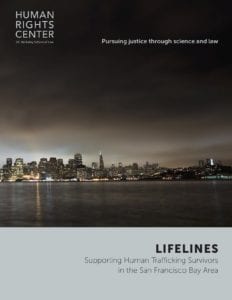The Bay Area—a national epicenter of sex and labor trafficking—needs more resources to house and care for survivors, according to just-released UC Berkeley study
 Bay Area counties must provide more services to victims of human trafficking—especially housing—and better adapt to recent legislation that prohibits arresting Commercially Sexually Exploited Children, according to a new study conducted by researchers at the Human Rights Center, UC Berkeley School of Law.
Bay Area counties must provide more services to victims of human trafficking—especially housing—and better adapt to recent legislation that prohibits arresting Commercially Sexually Exploited Children, according to a new study conducted by researchers at the Human Rights Center, UC Berkeley School of Law.
“While the new California laws that bars police from arresting trafficked children is well-intentioned, it is important that we find better ways to protect these children from their traffickers,” explained Eric Stover, the Human Rights Center’s Faculty Director, who co-led the study. “A first step in that direction is investing more resources in social services, including safe and appropriate housing for survivors, as well as improving the capacity of law enforcement to investigate and prosecute traffickers.”
Researchers at the Human Rights Center and International Human Rights Law Clinic, both at Berkeley Law, interviewed some 50 law enforcement officers and service providers for Lifelines: Supporting Human Trafficking Survivors in the San Francisco Bay Area in what is the first comprehensive look at anti-trafficking efforts across five Bay Area counties in recent years. The study is a companion to Building Trust: Perspectives on a Victim-Centered approach to Human Trafficking investigations in Los Angeles County.
Berkeley researchers also found that not enough is being done to halt labor trafficking or prosecute labor traffickers in the Bay Area because of negative attitudes towards victims of labor trafficking, who are often undocumented immigrants, a lack of training specific to labor trafficking, language and cultural barriers, and inadequate shelter and employment.
Additionally, researchers found that mistrust between law enforcement and victims as well as technological advances that have made it easier for perpetrators to engage in sex trafficking are among the biggest barriers to prosecuting perpetrators.
For more information or to interview researchers, contact Communications Director Andrea Lampros at 510.847.4469 or alampros@berkeley.edu